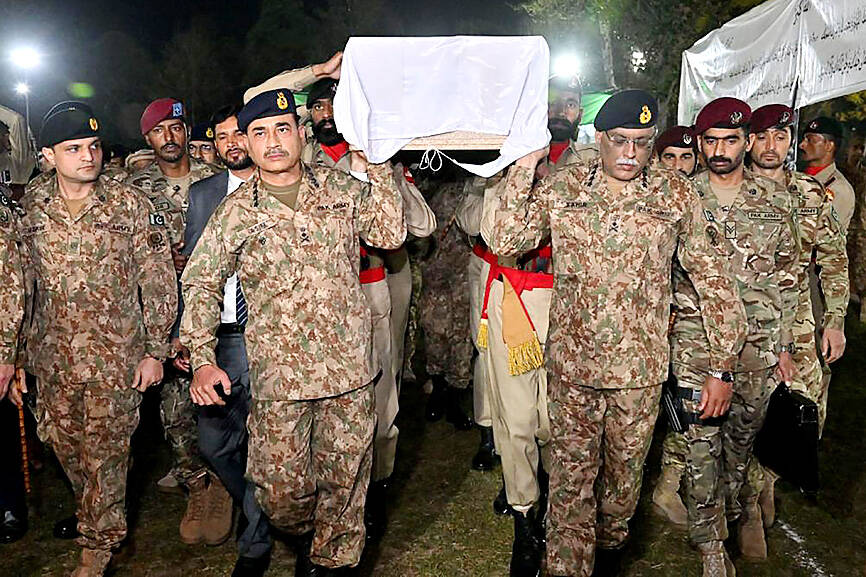Pakistani airstrikes early yesterday targeted multiple suspected hideouts of the Pakistani Taliban inside Afghanistan, killing at least eight people and drawing return fire from the Afghan Taliban, officials said.
The latest escalation is likely to further increase tensions between Islamabad and Kabul. The Pakistani strikes came two days after insurgents killed seven soldiers in a suicide bombing and coordinated attack in northwestern Pakistan.
The Afghan Taliban denounced the strikes as an aggression on Afghanistan’s territorial integrity, saying they killed several women and children.

Photo: AFP / ISPR
The Afghan Ministry of Defense in Kabul said Afghan forces later yesterday “targeted Pakistan’s military centers along the border with heavy weapons,” without providing details.
The Pakistani strikes were carried out in Khost and Paktika provinces bordering Pakistan, a Pakistani security official and an intelligence official said.
The officials provided no further details and spoke on condition of anonymity, because they were not authorized to speak to reporters.
Pakistan’s military did not immediately comment and it was not clear how deep inside Afghanistan the Pakistani jets flew. The airstrikes were the first since 2022, when Pakistan targeted militant hideouts in Afghanistan, although Islamabad never officially confirmed those strikes.
Separately, in January, Pakistani strikes — in a tit-for-tat exchanges with Tehran — hit Pakistani militants inside Iran, briefly raising tensions between the two neighbors. The situation calmed after Tehran and Islamabad agreed to cooperate against each other’s militants.
Chief Afghan Taliban spokesman Zabihullah Mujahid said in a statement that yesterday’s airstrikes killed three women and three children in the district of Barmal in Paktika Province, while two other women were killed in a strike in Khost Province.
“Such attacks are a violation of Afghanistan’s sovereignty and there will be bad consequences,” Mujahid said.
On Saturday, seven Pakistani soldiers were killed when a suicide bomber rammed his explosive-laden truck into a military post in the town of Mir Ali, a town in Khyber Pakhtunkhwa Province that borders Afghanistan.
Troops responded and killed all six attackers in a shootout, the military said.
Pakistani President Asif Ali Zardari attended the soldiers’ funerals and vowed to retaliate, saying: “The blood of our martyred soldiers will not go in vain.”
The Mir Ali attack was claimed by a newly formed militant group, Jaish-e-Fursan-e-Muhammad, but Pakistani security officials believed it is mainly made up of members of the Pakistani Taliban, the outlawed Tehrik-e-Taliban Pakistan, which often targets Pakistani soldiers and police.
Muhammad Ali, an Islamabad based security expert, said an army lieutenant colonel and a captain were among those killed in Mir Ali and that yesterday’s airstrikes were an obvious retaliation, coming within 24 hours of Zardari’s warning.
“Pakistan’s patience for the Afghan interim government’s continued hospitality for terrorists conducting frequent attacks on Pakistan from inside Afghanistan has finally run out,” Ali said.
Separately, the Pakistani military said security forces yesterday carried out an operation in North Waziristan near the Afghan border, killing eight militants linked to Saturday’s attack, but made no mention of the airstrikes inside Afghanistan.

Kehinde Sanni spends his days smoothing out dents and repainting scratched bumpers in a modest autobody shop in Lagos. He has never left Nigeria, yet he speaks glowingly of Burkina Faso military leader Ibrahim Traore. “Nigeria needs someone like Ibrahim Traore of Burkina Faso. He is doing well for his country,” Sanni said. His admiration is shaped by a steady stream of viral videos, memes and social media posts — many misleading or outright false — portraying Traore as a fearless reformer who defied Western powers and reclaimed his country’s dignity. The Burkinabe strongman swept into power following a coup in September 2022

‘FRAGMENTING’: British politics have for a long time been dominated by the Labor Party and the Tories, but polls suggest that Reform now poses a significant challenge Hard-right upstarts Reform UK snatched a parliamentary seat from British Prime Minister Keir Starmer’s Labor Party yesterday in local elections that dealt a blow to the UK’s two establishment parties. Reform, led by anti-immigrant firebrand Nigel Farage, won the by-election in Runcorn and Helsby in northwest England by just six votes, as it picked up gains in other localities, including one mayoralty. The group’s strong showing continues momentum it built up at last year’s general election and appears to confirm a trend that the UK is entering an era of multi-party politics. “For the movement, for the party it’s a very, very big

ENTERTAINMENT: Rio officials have a history of organizing massive concerts on Copacabana Beach, with Madonna’s show drawing about 1.6 million fans last year Lady Gaga on Saturday night gave a free concert in front of 2 million fans who poured onto Copacabana Beach in Rio de Janeiro for the biggest show of her career. “Tonight, we’re making history... Thank you for making history with me,” Lady Gaga told a screaming crowd. The Mother Monster, as she is known, started the show at about 10:10pm local time with her 2011 song Bloody Mary. Cries of joy rose from the tightly packed fans who sang and danced shoulder-to-shoulder on the vast stretch of sand. Concert organizers said 2.1 million people attended the show. Lady Gaga

SUPPORT: The Australian prime minister promised to back Kyiv against Russia’s invasion, saying: ‘That’s my government’s position. It was yesterday. It still is’ Left-leaning Australian Prime Minister Anthony Albanese yesterday basked in his landslide election win, promising a “disciplined, orderly” government to confront cost-of-living pain and tariff turmoil. People clapped as the 62-year-old and his fiancee, Jodie Haydon, who visited his old inner Sydney haunt, Cafe Italia, surrounded by a crowd of jostling photographers and journalists. Albanese’s Labor Party is on course to win at least 83 seats in the 150-member parliament, partial results showed. Opposition leader Peter Dutton’s conservative Liberal-National coalition had just 38 seats, and other parties 12. Another 17 seats were still in doubt. “We will be a disciplined, orderly